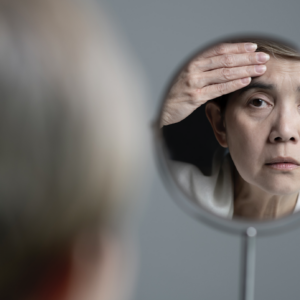By All Appearances: Accepting Your Appearance As You Age

By All Appearances: Accepting Your Appearance As You Age
April 10, 2024
How do you think you look compared to your peers? Do you all look about the same age? Would someone think you’re younger than your same-aged friends? Do you think you look younger than your chronological age? Does it even matter one way or another about whether you look young for your age? Well, you may not have given this much thought and you may not have strong feelings about this, but according to new research from the University of Oklahoma, how young you think you look may have actual consequences for how you experience aging (positively or negatively), which in turn can affect your health. So put down your mirror and let’s take a look at this research.
Looking at data from about 2000 participants ages 50-80, researchers polled participants to find out how they thought they looked compared to peers. The majority (59%) said they thought they looked younger than their peers. Women more than men thought they appeared younger than their same-aged peers, though women also spent more time and money trying to make themselves look younger. While that suggests they had some anxiety about their appearance, they also told researchers that they experienced a more positive response to aging and less ageism and discrimination due to their younger appearance. We know that positive attitudes toward aging and a positive self-perception can help you live longer than peers with a negative attitude toward aging. You can find out more about this study here and here.
Concern about one’s appearance as we get older is a real phenomenon, however, and it can negatively affect not only our attitude toward aging but also how we experience life as an older adult. For example, in a recent survey sponsored by the website Luvly, 2000 women aged 30 and above were asked about their appearances and how anxiety about aging affected their lives. Recognizing that there’s a much higher bar for women to appear younger than men, the survey found that 41% of the respondents said their aging appearance was affecting their mental health, leaving some to fear isolation or loneliness as they got older. Three out of four respondents said they would be upset if someone mistakenly assumed they were older than they actually are. To find out more about these survey results, try to stop comparing yourself to others and read here.
Val Monroe, the former magazine beauty editor and author of the wonderful substack How Not To F**k Up Your Face, was recently interviewed about appearances as you age. Her comments are insightful. She says, “We’re presented with this impossible ideal, so we’re constantly yearning for this goal that is not available to us.” She goes on to explain that her goal in addressing issues of beauty is to encourage women not to scan their faces for flaws, and she wisely explains, “If you can learn how to look into your own eyes in the mirror and see the person who lives there, rather than scanning your face for flaws, you’ll start to feel better about yourself. You don’t love the women in your life based on what their faces look like. You love them based on who they are. And if you can give yourself that compassion, that love, you’ll begin to feel different about what you see in the mirror.”
Finally, speaking of compassion for yourself when it comes to physical appearance, a recent post in Psychology Today offers 10 strategies to foster a positive body image as you get older in our youth-drenched society. Among the suggestions: adopt realistic role models whose attributes you admire; avoid making disparaging remarks about your own body- no negative self-talk!; and get accurate information about what’s natural and normal as a woman’s body ages. To find out more, perk yourself up with a pep talk and click here.







